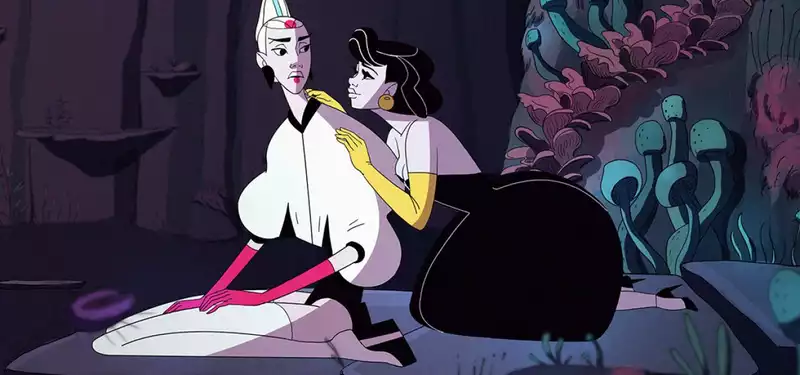Sep 17, 2018
Watch the online premiere of the pilot for the Danish adult fantasy "Fjer" (NSFW)
Cartoon Brew presents the online premiere of the concept pilot for Fjer, a dark, poetic and freaky urban fantasy web series about liberation and the discovery of one's sexuality.
The concept pilot was produced by Danish animation studio Sønc and marks the young company's first steps into the international market.
Although the pilot has been completed, the project as a whole is still in its conceptual stage. Director Janet Norgaard and producer Lorraine Lescanne are currently considering what format would best fit their narrative world. In the meantime, they are sharing their pilot with Brew readers, as well as some lessons learned while developing and pitching the concept.
The eight-minute pilot took barely six months to make. During that same time period, the studio had assembled a team, developed an entire world of concepts, and wrote treatments and scripts for the web series episodes. 'Basically, there was no time to think,' says Nørgard. 'It was crazy, but it was a great experience in the sense that it was mind-blowing. Everyone on the team pushes to make it happen, and you feel like you're proving yourself. And then afterwards you can actually look back and see what worked and what didn't work."
Originally conceived as a feature film, "Fjer" evolved into an 8 x 6-foot web series to participate in Denmark's web series program for new talent.
"It's a really cool format to introduce this kind of animation to an adult audience in Europe," said Fjer. Audiences have a smaller commitment to this format." It can be tough to get used to watching animation, especially limited animation. So I think [the web series format] is a good entry point for European adults to start watching anime."
After completing the concept pilot, Noorgaard continued to rewrite the story for months in order to adapt the story world to the web series format. Ultimately, however, she realized that Fjer's complex characters and detailed worldview were not suited to the web series format, which required a beginning and end to each episode.
"There was something about the format that didn't feel right [for this particular project]," Nørgaard recalls. But as a young director and screenwriter, I was too eager to prove that I could do this, and I asked myself, "Is this the best way to tell this story?"
and I didn't have the courage to ask myself, "Is this the best way to tell this story?
Currently, the studio is exploring different formats for the project, and this time we are considering the format that best suits the characters and the world." I guess I just wasn't prepared for how much I would be influenced by other people's opinions about the project: ...... You really need to set a big anchor on the ground that says, "This is how I am (as a project)." Because people push you and ask you questions, and at some point you get confused and you go, 'I don't know anymore.'" [When you're working on a project, there are billions of important topics in the world that could fit into a narrative. In order to stick to that one, you have to make some sort of pact with yourself beforehand."
In addition to the format, the team ran into difficulties navigating today's focus on female-led narratives. 'When we talk about this project, a lot of people comment on the fact that it's a female character,' said the team. 'So it's something I was aware of the whole time I was writing it: ...... I felt I had to have all the will to do it differently and do it right. This way she would not have enough will of her own, this way she would be too much of a man in a woman's body, this way ...... No matter how far I went with the story, I felt like I was hitting a wall. "
She describes the difficult balance between her desire to actively create women's stories by women artists and her desire not to be pigeonholed into a particular category. She says, "This is what we want to do, and I think these are the best people to do it. Because of our gender, somehow it becomes political.... Why should I take on this responsibility just because I decided to write a female character ......."
The only solution, they realized, was to try not to think about it and just write the story. 'One can have an opinion. And get [opinions] from the right people. I know that if I send it to the right five people, I'll get really good, adequate feedback."
Developing an indie animation project takes a long time, and it's easy to get discouraged. Fortunately, Nørgard and Leskannes are able to get encouragement and advice from their industry peers at film festivals and events. One motivational comment from Yosuke Asama, a producer at Toei Doga in Japan, was particularly memorable. He told the duo, "It's super tough, but if you have to do it, you have to do it." Nørgard added, "What I took away from that is that it's never easy. But if you have a story to tell, you keep going until it gets out there. Somehow."
.



Post your comment